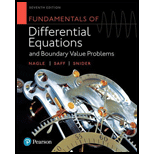
Concept explainers
Unless otherwise stated, in the following problems we assume that the gravitational force is constant with
An object of mass
Want to see the full answer?
Check out a sample textbook solution
Chapter 3 Solutions
Fundamentals of Differential Equations and Boundary Value Problems
- 5 сл Use vectors to prove the following theorems from geometry: (a) The diagonals of a parallelogram bisect each other. (b) The median to the base of an isosceles triangle is perpendicular to the base.arrow_forwardEstimate the instantaneous rate of change of the function f(x) = 2x² - 3x − 4 at x = -2 using the average rate of change over successively smaller intervals.arrow_forwardGiven the graph of f(x) below. Determine the average rate of change of f(x) from x = 1 to x = 6. Give your answer as a simplified fraction if necessary. For example, if you found that msec = 1, you would enter 1. 3' −2] 3 -5 -6 2 3 4 5 6 7 Ꮖarrow_forward
- 5 сл Use vectors to prove the following theorems from geometry: (a) The diagonals of a parallelogram bisect each other. (b) The median to the base of an isosceles triangle is perpendicular to the base.arrow_forward78 222÷12arrow_forwardGiven the graph of f(x) below. Determine the average rate of change of f(x) from x = -2 to x = 2. Give your answer as a simplified fraction if necessary. For example, if you found that msec = , you would enter 3 2 2 3 X 23arrow_forward
- 29 Probability Theory: Central Limit Theorem Task: Refer to Question 29 in the provided document. Link: https://drive.google.com/file/d/1wKSrun-GlxirS3IZ9qoHazb9tC440AZF/view?usp=sharingarrow_forwardnot use ai pleasearrow_forwardList the possible values of a for which square root is between 6 and 7 and an element of natural numberarrow_forward
- Question 25 Jasmine bought a house for $225 000. She already knows that for the first $200 000, the land transfer tax will cost $1650. Calculate the total land transfer tax. (2 marks) Land Transfer Tax Table Value of Property Rate On the first $30 000 0% On the next $60 000 0.5% (i.e., $30 001 to $90 000) On the next $60 000 1.0% (i.e., $90 001 to $150 000) On the next $50 000 1.5% (i.e., $150 001 to $200 000) On amounts in excess of $200 000 2.0% 225000–200 000 = 825000 25000.002 × 25000 1= 8500 16 50+ 500 2 marksarrow_forwardTaxable income (R) 1-216 200 216 201-337 800 337 801-467 500 2021/2022 TAX YEAR Rates of tax (R) 18% of taxable income 38 916 +26% of taxable income above 216 200 70 532 + 31% of taxable income above 337 800 110 739 + 36% of taxable income above 467 500 467 501-613 600 613 601-782 200 163 335 + 39% of taxable income above 613 600 782 201-1656 600 229 089 +41% of taxable income above 782 200 4 1 656 601 and above 587 593 + 45% of taxable income above 1 656 600 TAX REBATES • A special relief/discount given to taxpayers. It is subtracted after the income tax has been calculated. • Every person qualifies for primary rebate. Older people are granted additional rebate i.e. If you are older than 65 years of age you will receive Primary and secondary rebate; If you are over 75 years you will receive primary, secondary, and tertiary rebate. Tax rebate type Primary (age below 65) Secondary (65 to 74) Tertiary (75 and older) 2021 R14 958 2022 R15 714 R8 199 R8 613 R2 736 R2 871 • TAX THRESHOLD…arrow_forward25 Topology: Properties of Compact Spaces Task: Refer to Question 25 in the provided document. Link: https://drive.google.com/file/d/1wKSrun-GlxirS3IZ9qoHazb9tC44OAZF/view?usp=sharingarrow_forward
 Trigonometry (MindTap Course List)TrigonometryISBN:9781337278461Author:Ron LarsonPublisher:Cengage Learning
Trigonometry (MindTap Course List)TrigonometryISBN:9781337278461Author:Ron LarsonPublisher:Cengage Learning Linear Algebra: A Modern IntroductionAlgebraISBN:9781285463247Author:David PoolePublisher:Cengage Learning
Linear Algebra: A Modern IntroductionAlgebraISBN:9781285463247Author:David PoolePublisher:Cengage Learning
 Mathematics For Machine TechnologyAdvanced MathISBN:9781337798310Author:Peterson, John.Publisher:Cengage Learning,Algebra & Trigonometry with Analytic GeometryAlgebraISBN:9781133382119Author:SwokowskiPublisher:Cengage
Mathematics For Machine TechnologyAdvanced MathISBN:9781337798310Author:Peterson, John.Publisher:Cengage Learning,Algebra & Trigonometry with Analytic GeometryAlgebraISBN:9781133382119Author:SwokowskiPublisher:Cengage




